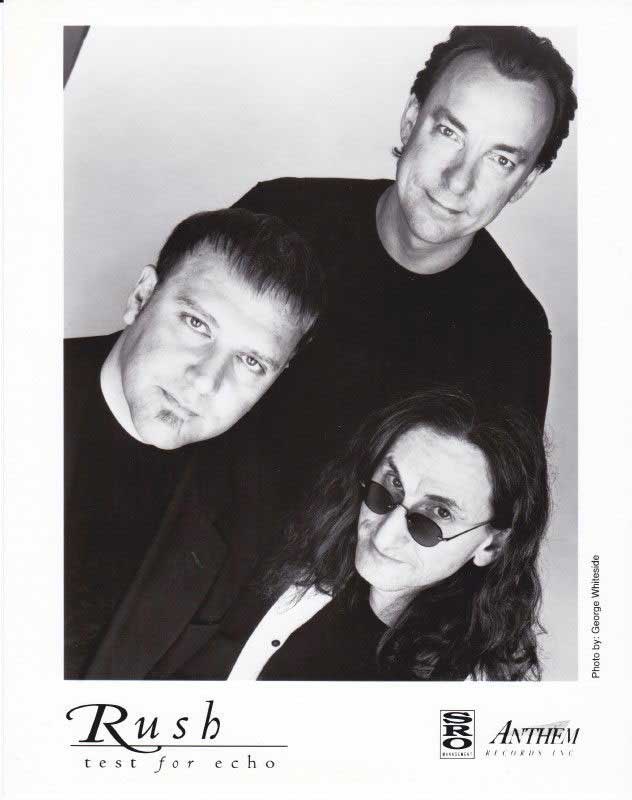Rejuvenated Rush Hits Grand Rapids On The Upswing
By Mark Newman, The Grand Rapids Press, October 23, 1996

"I'm the new guy," says Neil Peart, laughing at the fact that he wasn't the original drummer of the rock group Rush.
But Peart is who most rock historians and fans recognize as the one who pushed Rush from its original blue collar rock into more art rock realms, making the Canadian trio a force on FM radio in the late 1970s and early '80s.
Peart joined the band in July 1974 after original drumner John Rutsey quit shortly after Mercury Records re-released the band's self-produced debut.
"It's really not an interesting story," says Peart of auditioning in front of singer/bassist Geddy Lee and guitarist Alex Lifeson. "They were looking for somebody, I tried out and we got along well, and that was it. Before that I was playing in the local bands (in Toronto) and working in the farm equipment business."
Peart and the guys haven't toiled in the toiled in the club scene since. Today the band still tours and records more than 20 years after creating a buzz on American soils in the late '70s with concept albums like A Farewell to Kings and Hemispheres.
But the latter albums - 1980's Permanent Waves, 1981's Moving Pictures and 1982's Signals - were what made Rush an international smash.
The shorter songs on Permanent Waves, brought more radio airplay, and sold-out shows, includlng five nights at London's Hammersmith Odeon. Then in 1981, Moving Pictures' songs "Tom Sawyer" and the instrumental "YYZ" further established the band, "Tom Sawyer" climbing on the pop charts to No. 44 in June of 1981.
The U.S. success was sweet, but so were the sold-out gigs in London, where Peart had once visited before his Rush days.
Inspired by music of The Who and other British bands, Peart set out to experience Europe right after completing high school. He stayed there for about 18 months.
"I was searching for fame and fortune," Peart says. "It wasn't there."
But it was an invaluable experience where he learned about music, and about life. "I basically just copied a list of record companies and managers and booking agents off the back of record albums," Peart says. "It was one of those things where experience was worth more than success at that time. I got to play in some bands, have a real job and make a living, things that are life affirming."
Rush kept up with the times and released other albums in the '80s. Some did better than others. The '90s included Chronicles, a 1991 collection of essentials from the band's career.
But not until the current Test for Echo did the members begin to feel invigorated again. One review said it was a "welcomed return by an irrepressible and influential band."
"Nothing wrong with it," he says of the review. "But I got some great advice from American writer Tom Robbins once. I had just read his novel (Shinny Legs And All) and then read a scathing review of it in the New York Times; it really made me mad.
"So I wrote to him and asked if he had been bothered by that review, and not to consider that it reflected his readers, and he wrote back saying that he never read his reviews because if he believed the good ones he would have to belive the bad ones, too. Since that time I'm careful not to read the reviews."
Still, band members were excited about Echo. The trio had been doing its own thing after release of '93's Counterparts. Geddy Lee stayed home as he and his wife had a baby girl. Alex Lifeson worked on a solo record. Peart produced a big-band tribute to Buddy Rich, for which he received the Buddy Rich Lifetime Achievement award.
It made Echo more satisfying for them to work together again.
"And also because it was such a departure; we took quite a long break from the band," Peart says. "The Buddy Rich tribute led me into a field of study with a teacher that led me to practicing every day down in the basement and completely re-inventing my approach to the drum set in a profound way after 30 odd years.
"To see it bear fruit on this record, and to feel the results I had been after... I feel fortunate to find the right teacher (70-year-old jazz player Fred Gruber), who led me to the paths of righteousness."